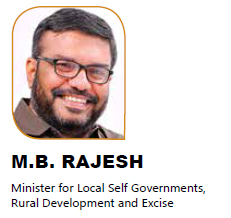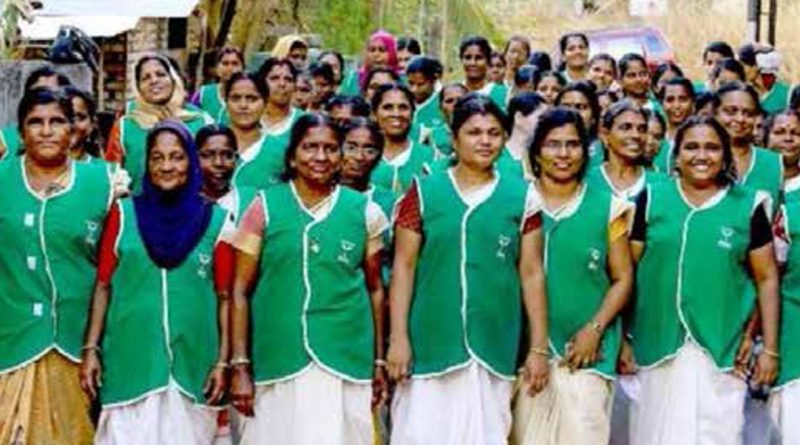Welfare fund for workers under Employment Guarantee Schemes Another Kerala Model

Kerala has become the first state in the country to launch a welfare fund for workers registered under the employment guarantee programme. The state has always led the way in ensuring the welfare of its workforce by rolling out many such innovative projects. The new welfare fund serves as a shining example of this impeccable track record. The Mahatma Gandhi National Rural Employment Guarantee came into effect with the enactment of an act passed by the Parliament of India in 2005. In fact, the first UPA government was forced to bring about this act under the pressure exerted by the left parties for a scheme to ensure employment and income to the vast majority of people in the country, who are poor. The scheme was envisioned to provide 100 workdays in a year to any family willing to do unskilled labour for a living and thus improve their lives. Enacted as a right-based law that guaranteed as many as 10 Constitutional Rights of the workers, the scheme was first implemented in 2006 in 200 districts including Palakkad. It was in this backdrop that Chief Minister Pinarayi Vijayan inaugurated the Labour Welfare Fund for workers under the employment guarantee scheme at Palakkad on May 15, 2023. As many as 26.81 crore workers from 15.03 crore families in the country have been registered under the Employment Guarantee Scheme. However, the number of active workers families are 9.55 crores and workers are about 14.29 crores. Out of these, only around 8.76 crore from 6.1 crore families received employment the previous year.
And that too they got an average of 47 workdays only. Only some 36.01 lakh families (5.8%) could receive the full quota of 100 work days. The Central Government has been constantly making efforts to weaken this scheme and thus has brought down gradually the allocation of funds towards its implementation. The shortening of work days and setting of new guidelines etc have affected the smooth progress of the project. Having clearly understood the concerns of its workforce, the state government has come up with steps to ensure timely employment and wages. In fact, the first Pinarayi government itself had thought about the implementation of such a welfare fund and promised steps in this regard in its manifesto for the 2021 elections. Accordingly, the “Kerala Employment Guaranteed Workers Welfare Fund Act” was brought about on November 14, 2021, which came into effect the next day. As per the scheme, the government will pay an amount equalling the monthly instalment of Rs.50 paid by the worker to the fund. The amount thus paid is spent on disbursing the pension of workers and other welfare schemes. Any worker, who is aged between 18 and 55 years and who has registered with the Mahatma Gandhi National Rural Employment Guarantee Scheme or the Ayyankali Urban Employment Guarantee Scheme can become a member of the welfare fund. They should have engaged in unskilled labour at least 20 days a year in the year of applying or the two years that preceded. For those joining the welfare fund are guaranteed the benefits under the Employment Guarantee Workers Welfare Fund Act as listed below;
1) Pension for workers who have completed 60 years of age and paid instalments without a break up to 60 years
2 ) Family pension in case of the death of those who paid the monthly instalments for a period of not less than 10 years 3) Financial assistance in case of a member dies due to illness or accident
Another Kerala Model Welfare fund for workers under Employment Guarantee Schemes
4) If a worker is forced to withdraw his membership after becoming unable to work due to physical disability or disease, the person shall be refunded with the instalments paid along with prescribed interest.
5) Financial assistance for treatment to the members who suffer from serious ailments
6) Financial assistance for the marriage of women members and daughters of members as well as for treatment relating to delivery.
7) Financial assistance for the educational needs of members’ children. As per estimates, the state has 24.95 lakh
active workers from 20.67 lakhs families in the employment guarantee scheme. Out of these, 17.59 lakhs members in 15.51 lakh families are receiving an average annual work days of 63. At the same time, 4.49 lakh families or 29 percent received the full quota of 100 work days. While the Scheduled Tribe families in the country received 52 work days, Kerala could give them 86 work days. Alongside, the state has also successfully implemented a Tribal Plus Scheme that envisages adding 100 more work days to these ST families by utilizing the Tribal Development Fund to ensure them 200 work days a year. The state has also been implementing the Ayyankali Urban Employment Guarantee Scheme for its urban areas since 2011. As many as 3,18,463 families have registered in this scheme, which has led to the creation of 41,11,753 work days so far .The families that complete 100 work days a year
are also given a festival allowance of Rs.1000. Kerala is also the first state in the country to implement a full-scale social audit of its employment guarantee projects to ensure quality. As many as 62.99 lakh workers have registered in the MNREGS. Out of these, 38.52 lakh are aged below 55 years while 23.06 lakhs are above 60 years. A total of 8.32 lakh belong to the ST category while 2.23 lakh are SC. 39.67 lakh are women workers. On the other hand, 3.18 lakh workers have registered in the AUEGS, which together aim to
guarantee 100 working days across the rural- urban locations. Most of those depending on these schemes, unlike those in the organised sectors,
have no other means of livelihood. And among these, 47.79 lakh people are aged below 60 years. The Welfare Fund has been created with a view to ensuring the welfare of such workers. As nearly 90 percent of the employed in these schemes are women, the need to secure their lives has prompted this government in enacting the new act. The state has several welfare boards that together offer succour to hundreds of workers and the poor and has also implemented several Social Security, housing and health schemes for them. The Welfare Board for workers under the rural and urban employment guarantee scheme comes as a continuation of these projects in Kerala — also the first state to implement an employment guarantee scheme for unorganised workers in the urban centres through the AUEGS. Hopefully, this board will be able to come up with more schemes in future to ensure the welfare of this workforce.


